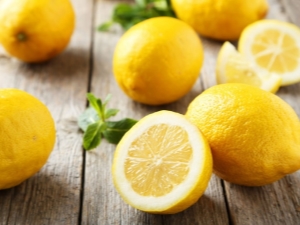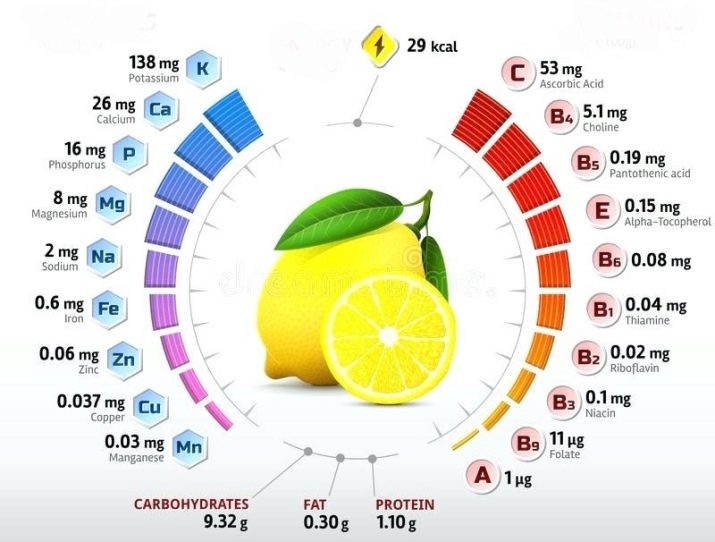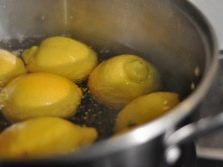What is useful and harmful lemon?

It is difficult to imagine that this democratic and fairly widespread fruit contains about 40 beneficial elements, helps to clean the blood and blood vessels, strengthens the heart and immunity, protects against cancer and helps digestion. This is a lemon - a sunny yellow fruit, at the mention of which the majority of people begin a reflex increase in salivation. What can you do - you do not need a large number of "experiments" and tastings to get acquainted with the sour taste of citrus and at the subconscious level to remember it.
What it is?
Lemon belongs to the genus of citrus, family rutovyh. This is the name of both the evergreen tree and the fruit that ripens on it. By the way, from the point of view of botany, lemon, like all citrus fruits, is considered not a fruit, but a multigrain berry.
Currently, lemon does not exist in the wild, probably it appeared as a hybrid in the subtropics. For the first time began to be cultivated in China, India and on tropical islands, abandoned in the Pacific Ocean. Today, the cultivation of lemons is engaged in most countries with a subtropical climate, as well as in the south of Russia, in the Caucasus, in the Crimea, Azerbaijan, and Uzbekistan. The main suppliers are Mexico, India, Egypt, Azerbaijan.
Lemon is a perennial sprawling evergreen tree up to 5 m high with a crown of pyramidal type. The branches of a young plant are usually covered with spines. Lemon leaves have a characteristic characteristic of all citrus fruits. These are oval leathery leaves with a pronounced citrus aroma, dark green above, lighter below.
The plant is thermophilic, requiring a long duration of daylight, capricious to moisture and soil composition.
Beginning from the mid-end of spring, the period of the flowering of lemons begins, and by autumn fruits are formed. They are "ovals", narrowed on both sides at the ends. The upper part is a bright yellow, slightly hilly crust with a large number of glands containing essential oils.
The inner part of the pulp is usually lighter, divided into several chambers. The flesh contains several seeds of light yellow or white, in the cut of green.
Composition
Lemon contains about 40 active ingredients, most of which are beneficial to the body. A peculiar taste of the fruit is obliged to a large number of organic acids (citric, malic), as well as vitamin C. However, contrary to the current opinion, it is not a champion in ascorbic acid content. In parsley, currant, wild rose, its volume is much higher.
The vitamin composition is also represented by vitamins B, A, E, PP, D. Also in the composition is potassium, magnesium, sulfur, fluorine, phosphorus, iron, zinc.
Lemon contains fiber and pectins, as well as ash, flavonoids, essential oils, tannins. Most of the fruit is structured water with elements dissolved in it (what is commonly called lemon juice).
Benefit and harm
The lemon rich with vitamins is the most powerful immunostimulating agent. It has a firming and tonic effect on the immune system, increasing its resistance to viruses and adverse environmental factors. That is why lemon is so useful for treating flu and colds.
In addition, it has an antiseptic effect, which suppresses the development of pathogenic microflora in the mouth, respiratory tract, intestines (this will be discussed below). Essential oils contained in fresh fruit have a beneficial effect on the upper respiratory tract, make breathing easier when the nose is congested.
According to the latest scientific research, lemon is a strong antioxidant due to the combination of vitamins A, E and flavonoids. It binds free radionuclides in the body, which are a "defective" molecule with a missing electron. Such molecules are easily deposited on healthy cells, disrupting their functioning. Such a “broken” cell is known to provoke the development of cancer.Thus, we can say that Lemon consumption is one of the preventive ways to prevent the development of oncology.
The beneficial properties of citrus extend to the cardiovascular system. First of all, the heart muscle is strengthened, which is caused by the effects of potassium and magnesium in the composition of the lemon. The conductivity of the heart improves, its rhythm is normalized. Vitamin PP in combination with ascorbic acid and tocopherol have a beneficial effect on blood vessels. With regular consumption of citrus improves the elasticity of blood vessels, capillary permeability. Antioxidants help lower blood cholesterol and prevent the risk of cholesterol plaque formation on the inner walls of blood vessels.
This means that the blood moves freely through the vessels, and thanks to healthy capillaries, every organ and tissue is fully saturated with oxygen and useful elements. In addition, lemon contains a small amount of iron. However, even in a small volume, it is almost completely absorbed from the lemon. This is largely due to vitamin C and organic acids.
With regular use of solar fruit can reduce the risk of atherosclerosis, varicose veins, heart attack and stroke, iron deficiency anemia.
Under the group B vitamins in the composition of the lemon refers to vitamins B1, -2, -5, -6, -9. All of them are involved in the metabolism, some - in the process of blood formation. In addition, vitamin B is necessary to maintain the functional state of the nervous system. Fruit helps to improve the conductivity of nerve impulses, strengthens the central nervous system. It is recommended for chronic fatigue, psycho-emotional overload.
Phosphorus in the composition of lemon in combination with vitamin B improves brain function, helps to tone up blood circulation in the head and neck, and increases concentration. The pleasant sour taste and the characteristic citrus aroma of the fruit will help to quickly cheer up, “reset” the brain.
Lemon can and is even recommended to include in the diet with hypertension and diabetes. It cleans the blood vessels and helps to reduce blood pressure. The glycemic index of the fruit is 15 units, so the lemon is allowed for daily consumption with sugar disease. It will provide the diabetic body with necessary beneficial components, strengthen the heart and blood vessels, relieve edemas, raise the immune forces, but it will not cause a jump in blood sugar.
Undoubtedly, the benefits of lemon and digestive organs. Organic acids promote faster and complete absorption of food, stimulate the production of gastric juice. As a result, food does not "stagnate" in the stomach and intestines, but brings maximum benefit to the body.
Dietary fiber in the composition of lemon act as a "whisk", removing toxins from the intestines, slags, mucus. This allows you to get rid of such unpleasant consequences of digestive disorders, as bloating, feeling of heaviness, flatulence. In addition, under the influence of fiber improves intestinal peristalsis, which also means better digestion of food.
All this contributes to the acceleration of metabolic and lipid metabolic processes. But it is precisely a violation of metabolism that causes excess weight, obesity, and many diseases.
Having an antiseptic effect, lemon helps prevent intestinal infections, destroy pathogens.
Lemons are useful in diseases of the joints, as they reduce the amount of purines in the diet. Purines also contribute to increased formation of uric acid, which provokes the deposition of salts in the joints. Also, due to the diuretic action, it is possible to excrete uric acid from the body, but at the same time avoid a shortage of vital elements. Thus, the lemon helps to alleviate the condition of gout, arthrosis, polyarthritis.
In combination with honey, lemon or juice from it is often included in the composition of therapeutic ointments, which are applied to the joint area during exacerbation of the disease.
For women
Lemon, along with an apple, can be called "rejuvenating." It's all about the presence of antioxidants in the composition. In addition to the antitumor action, antioxidants remove toxins from the body, slow down the aging process of cells.
Vitamin B in the composition ensures the beauty and elasticity of the skin. Add to this the said antioxidant effect, in order to assert that lemon helps to slow down the aging of the skin and maintain its elasticity.
These properties allow the fruit to be widely applied not only inside, but outside as part of masks and cosmetic creams. When used externally, the fruit, thanks to organic acids in its composition, demonstrates a whitening effect and helps to combat skin oilyness. Lemon juice is effective for strengthening nails, treating fungus.
With its ability to speed up metabolism and improve digestion, lemon is used to reduce weight. At the same time, the fruit will provide the body with all vital vitamins and microelements, the deficiency of which is often observed with strict diets.
The lemon is very successful combination of vitamins and minerals. An example of this is the “tandem” of vitamin A and E, which contribute to the production of female sex hormones. The lack of the latter leads to a cycle failure, and in difficult cases - amonorrhea, the inability to conceive and bear the child. The decrease in the amount of hormones produced is observed during menopause, therefore, women over 50 years old, it is highly desirable to include lemon in your daily diet.
Citrus is also useful for pregnant women, because it has a pronounced cough and immuno-strengthening effect. The fruit is rich in folic acid, so necessary for expectant mothers, especially in the first trimester of pregnancy. Folic acid, which is vitamin B9, is involved in the formation of the fetal neural tube, is necessary for the development of the brain, spinal cord, and some other internal organs.
Potassium in the composition will help the woman "in position" to cope with edema, and magnesium has an anticonvulsant effect, prevents the risk of muscle spasm, including the uterus. Together, potassium and magnesium strengthen the heart, which during pregnancy has to “pump” almost 2 times more blood.
Having a laxative effect, lemon will help to clean the intestines and gently relieve constipation, often accompanying the first and last months of pregnancy. The fruit contains iron and calcium, which are absorbed quite well due to the combination with ascorbic acid. Namely, these elements are usually in short supply during pregnancy and breastfeeding.
During lactation, the lemon helps the female body to recover faster after childbirth, providing it with the necessary elements. In the absence of a negative reaction from the health of infants lemon, it is not forbidden to eat lactating women.
However, it is worth noting that, in most cases, the fruit causes stool disorders, colic and skin rashes in infants.
Do not try to introduce it into the mother's diet before 2-3 months after birth.
For men
Speaking about the benefits of lemon for men, it is fair to start again with its antioxidant effect. Lemon is able to excrete toxins and toxins from the body, clean the blood vessels and upper respiratory tract. This makes it useful for people working in heavy production or smoking. In addition, thanks to its ability to purify the body, lemon helps to cope with manifestations of hangover syndrome.
The combination of vitamins B and zinc provides an improvement in the reproductive function of men. This is due to the fact that these components contribute to the production of testosterone - the main male hormone.
In many ways, it is he who determines the ability of a man to conceive, as well as the quality of sperm.Given that lemon gives a slight diuretic effect and acts as an antiseptic, we can talk about its ability to prevent the development of diseases of the urogenital system. Regular consumption of fruit helps to maintain an erection, increases libido.
The level of testosterone affects the general well-being, performance of a man. Largely due to this hormone, it is possible to build muscle mass in men.
For kids
Lemon for children appears most often as a strengthening immunity and cold-fighting remedy. Fruit provides a growing body with vital elements, including calcium. The latter is necessary for the formation of bones and teeth.
Phosphorus is good for the brain, it stimulates mental activity, helps fight fatigue. In this regard, it is recommended to include fruit in the diet of schoolchildren.
With antiseptic properties, lemon can be used as a safe treatment for helminthiasis. He, unlike most drugs, will not cause violations of the microflora. To this end, lemon is used not only inside, but also as a composition for enemas.
Finally, citrus contains vitamin D, which prevents the risk of rickets in children; in adolescents, this vitamin is also responsible for normalizing hormonal levels.
Despite these medicinal properties of the fruit, it has contraindications to the use. First of all, its consumption should be abandoned if you are individually intolerant of lemon or are allergic to citrus. High concentration of acids in the composition is dangerous for people with a high level of acidity of gastric juice, because it only worsens a person’s condition. For the same reason, it is worth refraining from consuming fruit in the acute period of gastritis, peptic ulcer, pancreatitis, colic, Crohn's disease.
In case of serious pathologies of the pancreas, kidneys and liver, you should consult a doctor before consuming a lemon. Despite the low calorie content and low glycemic index, lemon should not be eaten with type 1 diabetes. In case of disease 2 of the second type, it is better to obtain permission from the doctor beforehand.
With high pressure, lemon can cause both harm and be useful. It cleans blood vessels and helps reduce pressure. However, this increases the tone of the vascular walls, which in some cases can provoke a hypertensive crisis.
Due to the high acidity of the fruit, it can cause irritation of the mucous membranes in the mouth, which is especially noticeable when the teeth are extremely sensitive. Rinsing the mouth after consuming a lemon will help to get rid of unpleasant sensations and protect the tooth enamel. It is better not to give lemon to children under 3 years old, as a still weak digestive system will not cope with fruit processing.
Can I eat on an empty stomach?
Answering the question of whether a lemon can be eaten on an empty stomach, one should take into account the peculiarities of the state of the body, as well as the form, type of lemon (whole fruit, juice, fresh or thermally processed, etc.).
Drinking fresh from it on an empty stomach is not only harmful, but also dangerous. Due to the large amount of organic acids, lemon and concentrated juice will have a negative effect on the gastric mucosa, which can lead to an ulcer over time.
But if you reduce the concentration of lemon juice, diluting it with water, this drink is quite possible to take on an empty stomach. These same acids, but in much smaller quantities, will stimulate the production of gastric juice and prepare the entire digestive system for digestion in the near future.
This will allow food to be better absorbed and prevent the accumulation of toxins and waste products in the intestines. Such positive effects entail an acceleration of metabolism and strengthening of the immune system (after all, most of the immune cells "live" in the intestine). Water with lemon or juice, drunk 15-30 minutes before a meal, will also have an appetite-stimulating effect.
Honey helps to increase the benefits of lemon water. It is put on a glass of water approximately in the volume of a tablespoon.
Next, we turn to the question of the state of human health, primarily indicators of the acidity of gastric juice. With low acidity of the latter components of the lemon drink will help increase its acidity, thus avoiding indigestion.
It is easy to guess what will happen when eating lemon juice on an empty stomach with increased acidity of the stomach. The mucous membranes will receive a double portion of the acid, which can provoke erosion, ulcer, gastritis. This category of people, lemon (or rather, lemon water) on an empty stomach is contraindicated.
The solution is to consume lemon 15 minutes from the beginning of the meal or an hour and a half after a hearty meal.
If the acidity is increased slightly, you can drink water with lemon and fasting, lowering the concentration of the latter.
What kind of use?
Almost all parts of the lemon are recyclable and benefit the person. Fresh fruit is delivered to stores for consumption or for culinary use. Lemon juice is widely used in pharmaceuticals (the most well-known headache remedy “Citramon” contains citric acid), cosmetology.
Lemon juice acts as a natural stain remover (for example, removes stains from blood, wine, ink), helps to give shine to plumbing.
Essential oils are prepared from the peel rich in esters. They are used as antiseptics, painkillers, bactericidal and hemostatic agents. And aromatherapy helps to calm down, relax, relieves a headache. In cosmetology, lemon oil is used to treat acne as an antifungal agent. Possessing a pleasant non-clotted odor, the oil is often used to flavor the house.
Lemon can be consumed fresh, it is stored for a long time in the refrigerator and even room conditions. Another way to preserve "utility" - freeze the fruit or juice from it. Frozen fruit should be with the skin. If the lemon is frozen completely, then after it you need to rub and re-send it in the freezer.
Sun-dried lemons are able to transform the taste of salads, cereals, casseroles and cottage cheese, kefir. They are used to decorate desserts and drinks. In addition to high taste, such citruses retain most of the beneficial components inherent in fresh fruit. However, due to evaporation of moisture increases the calorie content of dried lemons.
Cooked lemons, along with fresh ones, are widely used to cleanse the body and speed up metabolism. It is recommended to drink liquid after cooking in the morning on an empty stomach, and after half an hour to have breakfast.
Application
The most useful lemon with a crust, because it contains many nutrients, and vitamin PP is almost completely concentrated in it. Naturally, it is best to consume fresh lemon without exposing it to heat.
However, due to the specificity of taste, eating lemon in this form is not easy, so many people do this by sprinkling lemon slices with sugar. Sweetener does not affect the content of beneficial elements in lemon, but adds calorie content to it. From this point of view, it is much more useful to use honey instead of sugar.
The number of calories will be about the same, but honey significantly enriches the composition of lemon and expands its healing effect. On the basis of honey and lemon, there are many recipes, most of which are aimed at strengthening the immune system.
Usually, in addition to these components, the mixture includes dried fruits and (or nuts). It is enough to scroll through the meat grinder raisins, dried apricots and prunes with lemon, pour in honey and let it brew for 10-14 days. Take the composition should be 1-2 tablespoons once a day for a month, then take a break. The composition is effective for strengthening the immune system, dealing with colds, chronic fatigue.
Another well-known remedy that contains lemon is water with lemon and honey.This simple drink is recommended to drink on an empty stomach 20 minutes before breakfast. It will help to awaken the body, give a boost of energy and start the metabolism, preparing the digestive organs for food.
Preparing lemon water is very simple - you need to cut a circle or half of the circle of the fruit, pour water at room temperature. Citrus should be a little wrinkled with a spoon so that he put the juice. Add a tablespoon of liquid honey and drink immediately after waking up in small sips.
In order to lose weight, you can also drink lemon water during the day, replacing it with juices, teas, and coffee. Often, a similar reception of the drink is combined with a diet and cleansing the intestines. To clean the intestines using lemon juice and water, there are other indications - constipation, digestive problems, frequent bloating, skin rash. On 1 liter of water is usually taken the juice of one lemon.
One of the most famous drinks is, of course, tea with lemon. In black or green tea is enough to put a piece of lemon. Usually the drink is sweetened by adding sugar, sweetener, jam or honey. The important point is that at elevated temperatures, vitamin C is destroyed, so do not pour lemon with boiling water or add too hot tea. The optimum temperature is no higher than 60 degrees.
Make the taste and aroma of the drink more lemon, pronounced will help the zest. Dry or fresh lemon zest is put in the teapot with tea, and then the drink is prepared in the usual way.
Lemon tea is distinguished by its versatility. If you drink it warm, even slightly hot, it demonstrates a warming effect, helps to bring the temperature down, warm it pleasantly, and cope with the chills. You can enhance this action by adding cardamom, nutmeg, cloves and cinnamon to tea.
In the summer heat it is pleasant to drink cool lemon tea, which quenches thirst and refreshes. To emphasize the acidity of the drink will allow mint, you can add ice cubes to it, and replace sugar with vanilla.
Lemon can be brewed not only with tea, but also with coffee. Instead of the latter, it is better to take chicory - this is an invigorating caffeine-free beverage.
Lemon is a reliable kitchen "assistant". A few drops of lemon juice, added while beating egg whites, will help get steady and fluffy protein peaks. If you sprinkle an apple or pear sliced into slices with lemon juice, the halves will not darken for a long time.
Remove a bad smell in the kitchen will help a piece of lemon (you can even dry, accidentally forgotten in the refrigerator). It should be baked in the oven or heated in the microwave - in the kitchen will spread a pleasant citrus aroma. If you add a little juice in the water for washing dishes or windows, the glass will delight shining brilliance.
Lemon slices are used to make lemonades, they are usually combined with oranges, strawberries. Different types of plants (lime) are used to decorate beverages, confectionery.
Lemon peel is widely used in cooking. It is used to make baking beautiful color and citrus shade, add to sauces for meat and fish, marinades. If you season a vegetable or fruit salad with lemon zest, it will get an exquisite savor and fresh aroma. The rind goes well, as does the pulp of lemon, juice, and fish and seafood.
Drinks are prepared from lemon juice, cakes and other pastries are impregnated with syrup based on it, and jelly is obtained, and natural marmalade is obtained. In combination with olive or linseed oil, lemon juice is a useful salad dressing.
For dental treatment, eliminating bleeding gums, it is useful to take a mixture of lemon gruel and olive oil. To do this, the pulp of lemon is put in butter in proportions of 1: 1 and taken daily by teaspoon. You can apply the composition to the gums with light massaging movements and leave for a couple of minutes, then rinse your mouth.
The fasting lemon, which needs to be ground on a fine grater, will help to escape from the hangover syndrome.The required dosage is a tablespoon without a slide. Already after a couple of hours nausea, headache, weakness will pass.
When sore throat should cut the lemon into small slices (the skin does not remove), lightly sprinkle with sugar and dissolve, holding in the mouth. The frequency of the procedure - every 2-3 hours. You can also gargle with a concentrated lemon solution. For half a glass of warm water, add 3-4 tablespoons of lemon juice, mix and gargle with this mixture.
For violations of the cycle, uterine myoma and a number of other female diseases, traditional medicine recommends the preparation of gruel made of lemon and turmeric rolled with a crust. Take the mixture should be a tablespoon on an empty stomach daily.
Useful fruit has been used as an external agent. It helps in the regeneration of the skin, has an antibacterial and disinfecting effect, reduces inflammation. All this makes lemon a useful treatment for burns. Freshly squeezed juice is diluted slightly with water, moistened with a cotton pad and applied to the burned area for a few minutes.
In cosmetology, lemon and juice from it are used in the fight against freckles and pigmentation, shine and acne. It has a rejuvenating and toning effect.
Rinsing hair with lemon water will help to forget about dandruff, give hair shine, ease combing. Lemon juice with honey, applied to the hair and left for 3-5 hours under a towel, helps to remove the pigment from the color, restore the natural shade of the hair.
Lemon juice is added to the bath for nails, and essential oils are used for aromatherapy, anti-dandruff, and cellulite.
The benefits and dangers of lemon, see the following video.
























































